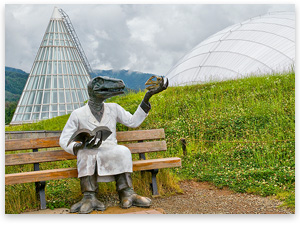
Dr. Uchronia
The history that didn’t happen can be just as interesting as the history that did.
This article is a small example of its own topic. Except by chance, I wouldn’t now be writing it. Not finding what I wanted while browsing in our library’s magazine aisles, I came across mention of “uchronie” in Le Nouvel Observateur. The philosopher Charles Renouvier chose this word as the title of his novel of 1857 and 1876; he coined it from Greek roots meaning “no time.” He was following the pattern set by St. Thomas More, whose Utopia derives from roots meaning “no place.” Utopia is a place that does not exist; uchronia is a time that did not exist. Uchronian works — to introduce the English adjective — are also called “what-if,” alternative, conjectural, or counterfactual history. They consider what would have happened if something else had chanced to happen.
Such works fall into two categories. The distinction is fuzzy but useful. Writings of the first kind, unlike actual history or a standard historical novel, are sheer fiction. They are not speculations about real events; they are stories that stand on their own. The Star Wars movies and Tolkien’s tales are good examples. Another is Islandia, a novel by Austin Tappan Wright, published posthumously in 1942. Wright describes events and personalities in a country on a fictional continent in the Southern Hemisphere before World War I. The people of Islandia, while highly civilized and advanced in philosophy and psychology, prefer their old ways, rejecting railroads and most other modern technology and narrowly limiting contact with the outside world. The reader (this one, anyway) drifts with the author into sympathy with the Islandian way of thinking.
Edward Bellamy’s Looking Backward (1887) projects an opposite vision, one intended as backward only in an ironic sense; it imagines a prosperous and happy socialist utopia of 2000. This uchronia actually exerted some influence in its time, converting many readers to socialism because they wanted to live in the world of Bellamy’s vision.
[continue reading…]
Help Promote Prometheus Unbound by Sharing this Post

Few philosophies have a greater mutual suspicion and natural antipathy to each other than libertarianism and ecology. This is not surprising, since the former takes the human individual and the latter the nonhuman environment, as its sovereign concern. But since our state-plagued era has seen the degradation of both individual liberties and the quality of the environment, we ought to question the degree to which these exist in an inverse relationship. Libertarians who wish to learn how to accommodate ecological ideas could do no better than to begin with a short 1975 novel by Ernest Callenbach, not because the novel has any libertarian intent (it clearly doesn’t), but because the principle of political decentralization, which Callenbach sees as an ecological necessity, leads him unconsciously, almost blindly, in a libertarian direction.
Ecotopia was clearly born out of the political and economic turmoil of the 1970s. As the book describes it, “The persistent inflation and recession of the seventies had caused widespread misery and undermined Americans’ confidence in economic progress.… And chronic Washington scandals had greatly reduced faith in central government.” Of course there was also a war that dragged on and on despite widespread opposition. In other words, it was a time much like our own, which may be why there has been a renewal of interest in the book in the last few years. A New York Times article from 2008 called it “The Novel that Predicted Portland” for its advocacy of green lifestyles. Well, not quite, as we shall see.
While contemporary greens tend to advocate greater power for national and international governmental agencies to regulate on behalf of the environment, Callenbach’s book was informed by decentralist and anti-authoritarian ideas of the New Left. These led him to a solution that had long since been thought impossible in American politics: secession. Ecotopia is also the name of a new nation in the novel, consisting of what used to be Oregon, Washington, and northern California, which seceded from the United States in 1980.1 In 1999, Will Weston, a journalist from what remains of the United States, sets out to write a series of articles about Ecotopian life. These, alternating with Weston’s private diary entries, comprise the novel.
[continue reading…]
Help Promote Prometheus Unbound by Sharing this Post










